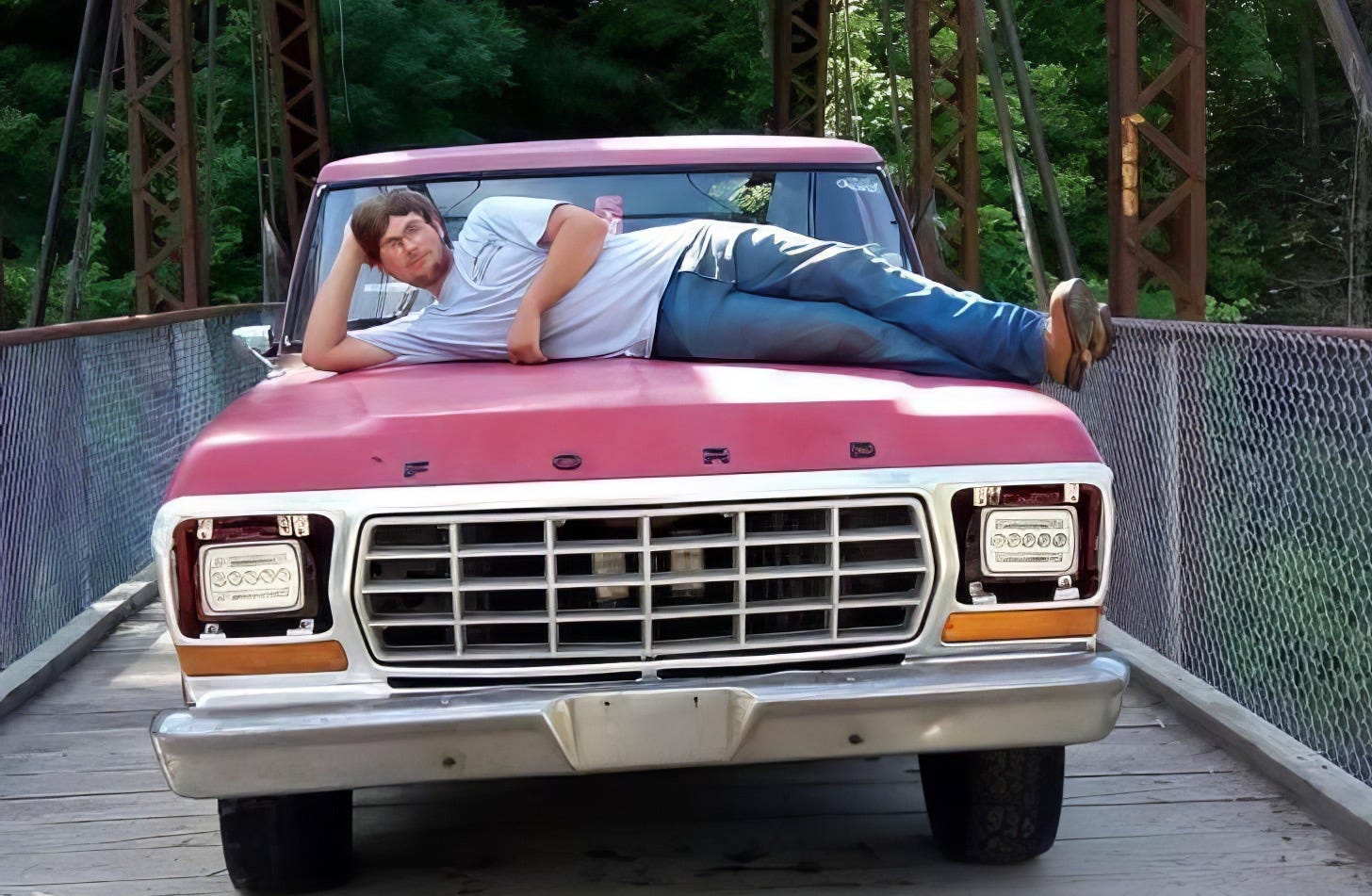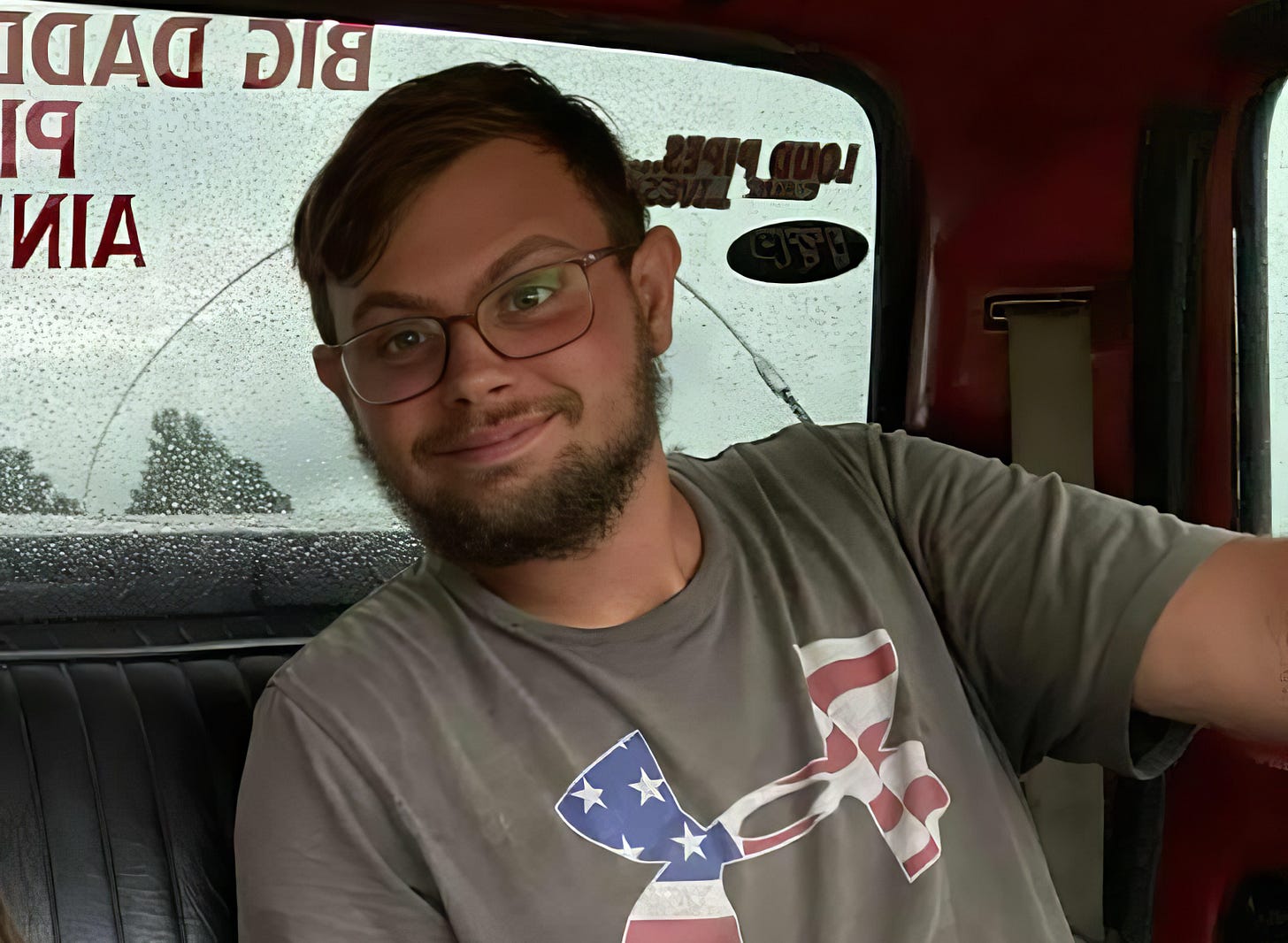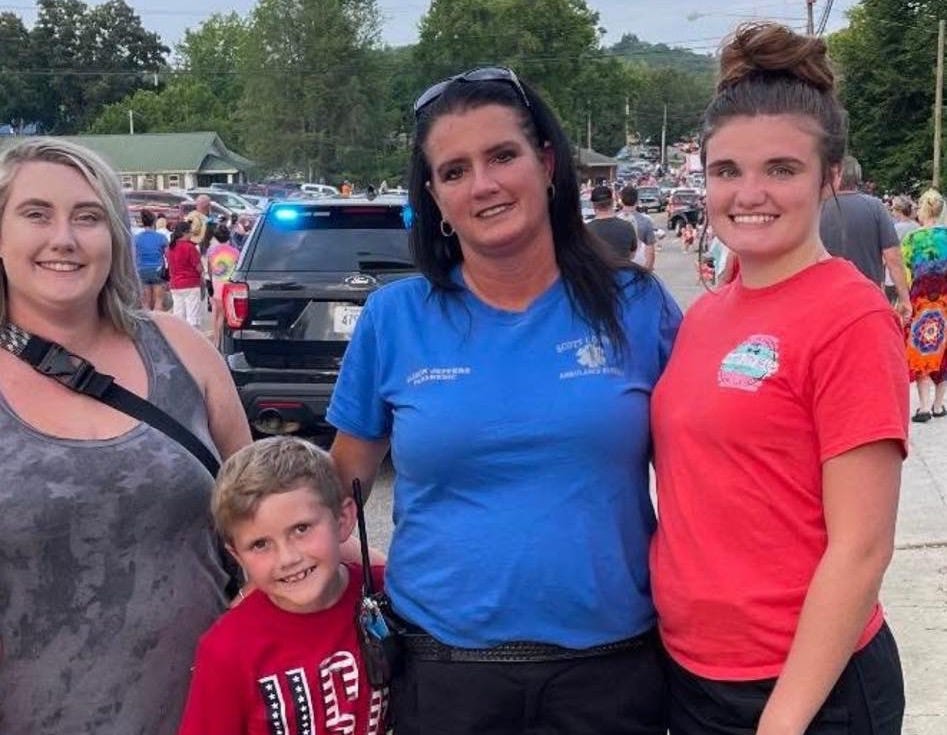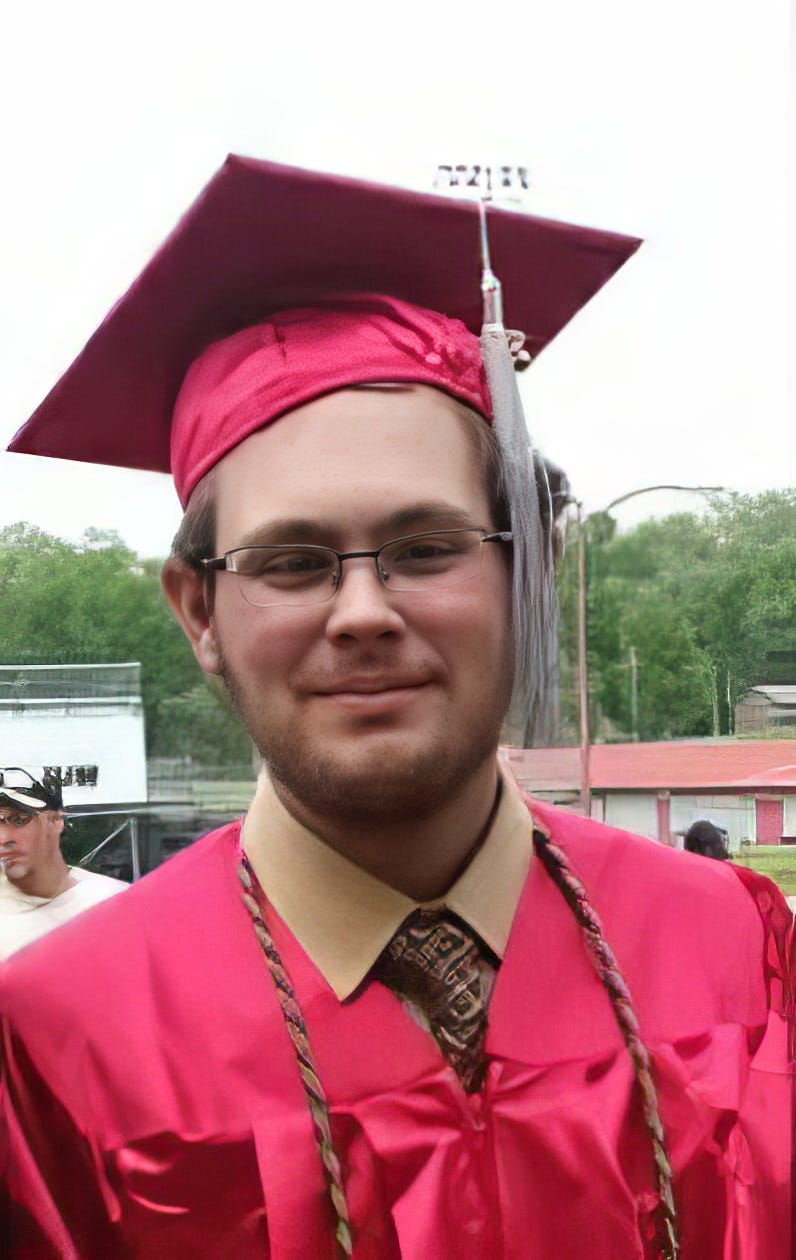Christian's gift: Six lives renewed through one life lived 'wide open'
Christian Wright's organ donations offered a new lease on life to six people throughout the eastern U.S., including one here in Scott County
You’re reading Friday Features, a weekly newsletter containing the Independent Herald’s feature stories — that is, stories that aren’t necessarily straight news but that provide an insightful look at our community and its people. If you’d like to adjust your subscription to include (or exclude) any of our newsletters, do so here. If you haven’t subscribed, please consider doing so!
Today’s newsletter is sponsored by First National Bank. Since 1904, First National Bank has been a part of Scott County. First National is local people — just like you. Visit fnboneida.com or call (423) 569-8586.
Christian’s gift: Six lives renewed through one life lived ‘wide open’

Christian Wright first checked the box — “Yes, I want to be an organ and tissue donor” — the first time he applied for a driver’s license, when he was just 17 years old. He talked about the decision briefly with his mother, then with the casual certainty of youth, he signed his name and walked out the door of the DMV without giving it much more thought.
Eight years later, that small act carried extraordinary weight. On the night of Aug. 18, Christian was just a typical 23-year-old, in the middle of that wide-open, uncertain stretch between adolescence and adulthood. He loved old trucks, loud engines, and weekends with friends. He hadn’t settled on what direction his future would take, though he was starting to put the pieces together. Then an ATV accident cut that life short.
But a story of tragedy didn’t end in a hospital room surrounded by family and friends. Because of a single, selfless decision, a part of him lives on in half a dozen people across the eastern United States — strangers who will now carry his legacy through their renewed lease on life, including one in his hometown.
Living life wide open
Christian Wright — his parents lovingly refer to him as “Christian Michael” — was the son of Kirby and Martha Wright of the Coal Hill community in southern Scott County. He was a brother to three sisters — Emily King, Rebecca Sexton and Madison Baxter; an uncle to four nieces and nephews — Bentley and Emma, John, and Lyla.
Martha says the best way to describe her son is the way his uncle in Oklahoma described him when Christian was just a kindergarten-aged boy: like Ricky Bobby, the character on the hit movie “Talladega Nights.” If you aren’t first, you’re last.
“That’s how he’s always been,” Martha said. “When he was seven years old, he had a trail worn between our house and my mom’s house where he rode his bike, and he’d make motorcycle noises as he rode.”
Christian always loved things with motors — from his trucks to his ATV. He loved tinkering with them, revving them, doing burnouts.
“He was built for building motors and working on cars and things of that nature. That’s what he was made to do,” Martha said.
After graduating from Scott High School, Christian completed the automotive program at Tennessee College of Applied Technology. He had recently looked into going back to school at TCAT to be a truck driver.
“He was finally getting into the spot where he was starting to figure out what he wanted to do,” Martha said.
Kirby said there’s one thing his son hated to do through his full-throttle approach to life.
“He’d give you his all,” he said. “But he hated to disappoint you. It ate at him.”
And once Christian started a project, he refused to give up on it.
“He might cuss, fight, growl and throw wrenches, but he wouldn’t quit until he figured it out,” Kirby said.
On the evening of Monday, Aug. 18, Christian had left home for a memorial ride to the Monster Pond on Brimstone for Mickey Riseden, who had passed three days earlier. Like Christian, Mickey loved things with engines and loved working on them. His nephew was Christian’s best friend. There had been a funeral service in Oneida that afternoon, then everyone was getting together for the ride to Brimstone.
As a longtime volunteer firefighter for the South Scott Fire Department, Kirby gets paged to emergency calls. Five minutes after Christian left home that evening, the tones sounded. There had been an accident nearby. First responders were being summoned to the scene.
Martha and Kirby looked at one another. No words were spoken; when you’re a parent, no words have to be. It’s an instinctive fear that every parent knows. Martha looked at her phone, and saw that Christian was located at the spot where the accident had been reported. She tried to call. No answer.
Still hoping that Christian had stopped to assist and simply didn’t have time to answer his phone, Kirby jumped in his car and drove to the scene. He arrived before emergency personnel. One of Christian’s friends stopped him and confirmed his fear.
“It’s Christian, and it’s bad.”
Kirby has been a volunteer firefighter for many years. He’s seen his fair share of accident scenes. His voice breaks as he remembers the sight, even now; as it does often when he speaks about his son.
“As soon as my headlights hit, I knew I probably wasn’t bringing him home the way I wanted to.”
While Kirby has been a volunteer firefighter who has assisted at accident scenes most of his adult life, Martha has spent a career in the health care industry. No one had to tell either of them what they were facing. They knew. They hoped, and they prayed. But they knew.
“We left the accident scene knowing what was happening,” Martha said. “You don’t see that and not know what you’re walking into. It made that ride (to Knoxville) really quiet.”
As hard as it was to see their son in that condition, Kirby said it would’ve been even worse to have learned of it the way parents in those situations usually learn their child has been in an accident.
“The only thing that would’ve made it worse would’ve been not making it down there and just getting a phone call that your son has been in an accident,” he said.
At University of Tennessee Medical Center in Knoxville, Kirby and Martha were ushered into a waiting room for outpatient surgery patients. The wait was long — no one was able to provide an update for an hour and a half after they arrived — but they weren’t alone. The waiting room soon crowded with people — family members and Christian’s friends. At any given time, there were 40 to 50 people in the waiting room, and it would stay that way throughout the night and the next day.
“As soon as a low would start to hit, someone would come up with some kind of statement, or show a video or something Christian had been in the middle of,” Kirby said. “And then everybody would be laughing.”
Kirby and Martha praise the staff at UTMC for their approach, as well as the first responders at the accident scene.
“From the first officers that pulled up on the scene to the last step we took out of UT, we got above and beyond in terms of compassion and respect,” Martha said. “An hour and a half later when the doctors came in, they didn’t try to talk above us. They just laid it out on the table and told us what we were dealing with. It wasn’t doctors talking to patients. It was mothers and fathers talking to mothers and fathers.”
The trauma team — including a neurosurgeon and an ER practitioner — had tears in their eyes when they stepped into the waiting room to provide an update, an update Kirby and Martha had prayed wouldn’t come, but an update they also knew was possible.
Organ donorship wasn’t on their minds; that’s the last thing parents think about when they’re grieving the loss of a child. At some point, though, a representative of Tennessee Donor Services — the non-profit organ procurement organization that works with hospitals to connect patients with life-saving gifts — gently approached the Wrights to remind them that Christian was a registered donor.
“When Christian was getting his license, he asked me, ‘Do I check this?’ I said, ‘If you want to.’ He said, ‘Are you a registered donor?’ I said yes. My grandma had a cornea transplant, and I’d always been a registered organ donor. He said, ‘Is Dad a registered donor?’ I said, ‘I think so.’ So he said, ‘I’m going to check it.’ I forgot all about that until the middle of the storm when the nurse asked me if I had a minute.”
Like the first responders and the trauma team at UTMC, the Wrights said Tennessee Donor Services handled the situation with respect and compassion. Even now, weeks after the accident, they check in with Kirby and Martha every day to see how they’re doing.
“They weren’t pushy. They just reminded us that Christian was a donor,” Martha said. “We had the option to say no. But we wanted to honor his wishes.”
A wish granted
Alison Jeffers has been battling declining kidney function for years. It’s a sort of internal fight that most people can’t see. But as her kidney function dipped below 10%, work became nearly impossible. Besides the fluid retention and the constant pain, she would be exhausted at the end of a day’s work.
“One thing about kidney failure is so many people say, ‘You don’t look sick; you’re just being lazy,’” she said. “It doesn’t show on the outside.”
As failing kidneys lose their ability to flush creatinine out of the body, symptoms can include fatigue and weakness, swelling, nausea and vomiting, loss of appetite, high blood pressure, and eventually confusion and seizures.
Earlier this year, push finally came to shove. Alison’s creatinine level had reached eight times the normal range. She had nearly exhausted her options for treatment and would have to start dialysis soon. Three days a week, for hours at a time, would have made it impossible to continue her work as an EMT instructor at TCAT Jacksboro — and that’s even if the dialysis worked. Some people’s bodies can’t tolerate dialysis and they quickly deteriorate or make the decision to forego further treatment.
So Alison was placed on a transplant list, and prayed for a compatible donor kidney.
Prior to making the move out of the field and into the classroom, Jeffers worked for years as a paramedic at the Scott County Ambulance Service. She’s seen too many fatal accidents; seen too many family members grieving the loss of loved ones. When she heard what had happened, she reached out to the Wright family — to offer her condolences, but also to let them know she was on the donor list.
That might have been the end of it. No one could fault grieving parents if a phone call — in a sea of phone calls seeking updates and offering sympathies — was forgotten. But on Wednesday night, Alison got a phone call. There was a donor.
The person on the other end of the line couldn’t offer her much in the way of details. But she knew — “it’s a 23-year-old male,” she told them. The representative told her that she could choose not to take the organ, but she was number 1,198 on the kidney transplant list if she declined it.
“Who in their right mind would say no?” she said. “I said, ‘Absolutely.’”
That same evening, Alison’s daughter drove her to UT Medical Center for one final blood test to be absolutely sure Christian’s kidney was a match.
From there, things were a whirlwind. The medical team hand-delivered Alison’s paperwork to the hospital. The blood sample was hand-delivered to Vanderbilt University Medical Center in Nashville.
Kirby was by Christian’s bedside when he got the call from Alison that she would be receiving Christian’s kidney.
On Friday morning, UTMC held an honor walk for Christian. It’s a formal procession where staff line the hallways to honor an organ donor as they’re taken to the operating room for organ recovery. Alison intended to be there, but her surgery was unexpectedly bumped up to earlier in the morning. When she arrived at the hospital, Kirby and Martha met her in the lobby.
“I just grabbed her and hugged her because that was all I could think to do,” Martha said.
The Wrights and Jeffers weren’t closely acquainted, but Alison and Kirby were familiar with one another from her days as a paramedic and his days as a volunteer firefighter. But there were other connections. The Wrights’ oldest daughter, Emily, had met Alison’s daughter, Taylor, in LPN class. Ironically, the first EMT worker off the ambulance that night at Christian’s accident scene was one of Alison’s former EMS students at TCAT Jacksboro. The next person off the truck that night was Alison’s last partner when she worked at Scott County EMS.
For Alison, the meeting in the lobby at UTMC brought forth a flood of emotions.
“It’s bad enough when someone dies,” she said. “I was so excited that life was going to be better for me, but in a way it felt like I was taking their child. I had to wrap my mind around that. In losing a child, they’re donating to me to give me a chance at life.”
Alison’s mom has also struggled with the decision. “What do you say to the person who saved your daughter’s life because they lost a son?” she asks.
What do you say? No one truly knows what to say if they’ve never been in that situation. Words can be shallow.
“The joke in our house now is that if you come to the door and say, ‘I’m sorry,’ I have full right to punch you in the throat,” Martha said. “You get to the point that you hear it so much that you don’t want to hear it anymore.”
“We didn’t know what to say either until we were faced with it,” Kirby said. “You can’t imagine unless you’ve been there.”
But for the Wrights, there was no need for Alison to apologize. The decision was an easy one.
“She’s going to get back in the classroom and help train more medics to get out in the field and help people,” Kirby said. “Christian has a connection with that.”
And Alison is just the start.
“This is their story. I’m just a part of it,” she said. “My life has changed. Six months ago I was thinking ahead to how I might not see my grandson a year from now. Compare that to thinking about what I am able to do now.
“Every day you don’t know what will happen. I was given a second chance of life.”
The Wrights know Alison’s story because she’s a member of their community. But across the eastern U.S., there are opportunities for similar stories. Christian’s heart went to a recipient in Georgia (“we can’t tell him that; he’d be mad because he hated Georgia,” Kirby joked). His other kidney went to Louisiana. His pancreas went to North Carolina and his liver went to Massachusetts. His lungs were sent to Iowa.
“We hope to hear from them somewhere down the line,” Martha said. “They have the option to not be contacted, but it would just be great if we can get in touch.”
“It would be awesome, if everything goes great, if we could just meet in a centralized location — just to share stories,” Kirby added.
Three weeks after the fact, Alison is well on her way to recovery. She isn’t back at work yet, but soon will be. Her kidney function drastically improved almost immediately, she’s lost weight, and she feels better. Transplant recipients must undergo myriad blood work as medical teams stringently test to see how their body is accepting the new organ, and she stays in daily contact with the Wrights. They check in on her, and she provides them updates from her doctors.
A lasting legacy
“One of the things that’s been helping us is that once the sixth person gets their gift, the rainbow is complete,” Kirby said. “Out of such tragedy, that’s the plus of the tragedy. We can focus on all the bad, but where does that get you?”
Still, the hurt of losing a child isn’t easily repaired. The constant flood of Christian’s friends in and out of the Wright home has helped occupy their minds, but the memories still come flooding back during the quiet moments.
“We’ll walk around the house and see something that makes us smile, then we’ll see something that makes us bawl like babies,” Kirby said. “People can’t understand it. We can’t sleep right, because our minds won’t shut off.”
Martha said that she and her husband have both buried their parents — and that’s painful, but it doesn’t approach the pain of losing a child.
“The way we describe it is to take the pain of burying your parents, multiply that by 1,000, and you still can’t touch the hurt,” Martha said. “Because there’s a piece of you missing. There are days you think you can’t breathe.”
It’s also been hard on the rest of the family. Eight-year-old Bentley was the oldest of the nieces and nephews that Christian adored. They did a lot together. Bentley sleeps with one of Christian’s coats under his pillow, and although he grasps what happened, eight is still too young to fully understand such loss.
“He’ll say, ‘Me and Christian were supposed to go for a ride,’” Martha said. “We offer to take him for a ride, but he won’t go. He says, ‘But Uncle Christian got us pizza Lunchables and Dr. Peppers.’ It’s not the same.”
Even the family’s German shepherd has had trouble adjusting. She still perks her ears up when she hears a loud truck drive by, the way she used to when Christian drove up to the house. “She’s struggling just as much as us,” Martha said.
One thing the Wrights have learned in the weeks since the accident is how many people their son touched in life. Mark Chitwood, the Tennessee Highway Patrol trooper from Pine Hill, was a sort of nemesis for Christian. He had written him no fewer than five speeding tickets. “They had a love-hate relationship,” Martha explained. “Christian loved to speed and Mark hated it.” But through their interactions, they developed a mutual respect. Trooper Chitwood led Christian’s funeral procession from Oneida to the cemetery at Coal Hill. Both Chitwood and Trooper Lowe, who was on the scene of the accident that night, attended Christian’s funeral. Also there was a staff member from Tennessee Donor Services.
Then there was the steady stream of visitors — not just at the hospital during those long days immediately after the accident, but at the Wright home since Christian’s funeral.
“We knew he had flown,” Kirby said. “We just didn’t know how far those little wings had taken him, and how many people he had touched.”
Christian Michael lived fast, loved deeply, and left sooner than anyone could’ve imagined. But now his parents are seeing how wide his influence stretched — not just from friends and neighbors who tell stories at their kitchen table, but also to strangers hundreds of miles away, whose names they don’t even know yet, whose lives are now being sustained by his.
It's not the ending the family would have chosen, but it is a beginning for others. That, perhaps, is the true meaning of legacy. He lived life wide open, never afraid to give all he had, and that spirit carries on.
“It’s hard as parents to let go,” Martha said. “But at the time you’re losing him, he’s helping someone else. Alison gets more time with her daughter and her grandson. These other five people we haven’t met, they might be mothers or fathers. Or they might be children with their whole lives ahead of them.
“In a sense, Christian hasn’t even started living his life yet.”
The importance of organ donation
More than 100,000 people in the U.S. are currently on a waiting list for a life-saving organ donation. Each day, 13 of them die while waiting on a transplant.
Only about 3 in 100,000 deaths occur under circumstances that allow organ donation. Therefore, increasing the number of registered donors helps improve the odds that available organs can match to patients who need them.
“Everybody says, and I’d heard it a million times, that if you’re a registered organ donor and something happens to you, they don’t put as much effort into saving you,” Martha Wright said. “That’s absolutely not true.”
In 2024, Tennessee Donor Services had 488 organ donor heroes, whose gifts enabled 1,371 lifesaving organ transplants. However, Tennessee is home to about 2,800 people on the transplant waiting list, and only about 44% of eligible Tennesseans are registered donors.
Like Christian Wright did, you can check the box that says “Yes, I want to be an organ donor,” when you apply for or renew your driver’s license or state ID. You can also visit Donate Life Tennessee’s website at donatelifetn.org to register.
Thank you for reading. Our next newsletter will be The Daybreaker bright and early Monday morning. If you’d like to update your subscription to add or subtract any of our newsletters, do so here. If you haven’t yet subscribed, it’s as simple as adding your email address!
◼️ Monday morning: The Daybreaker (news & the week ahead)
◼️ Tuesday: Echoes from the Past (stories of our history)
◼️ Wednesday: Threads of Life (obituaries)
◼️ Thursday evening: The Weekender (news & the weekend)
◼️ Friday: Friday Features (beyond the news)
◼️ Sunday: Varsity (a weekly sports recap)







